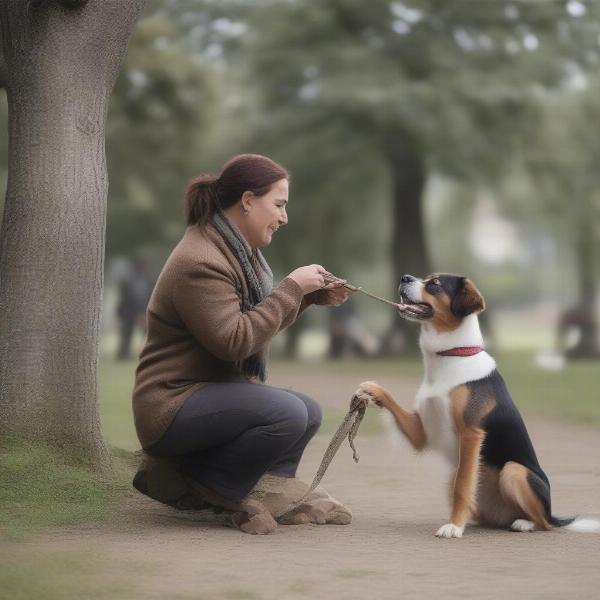The term “Gypsy Dog” often evokes images of free-spirited canines traveling with nomadic groups. However, it’s important to understand that “Gypsy Dog” isn’t a recognized breed. It’s more of a descriptive term encompassing various mixed-breed dogs often found living with, or associated with, the Romani people. These dogs are valued for their loyalty, resilience, and often, their guarding instincts. This article will explore the fascinating world of Gypsy Dogs, their typical characteristics, care requirements, and debunk some common misconceptions.
Decoding the “Gypsy Dog” Label
What exactly is a Gypsy Dog? The truth is, there’s no single answer. The term typically refers to dogs owned by Romani communities, often lacking formal pedigrees. They’re typically mixed-breed dogs, exhibiting a wide range of appearances and temperaments. Some common traits observed include medium to large size, sturdy builds, and a variety of coat colors and lengths. Many are adept at guarding and herding, reflecting their working roles within the Romani culture.
Common Misconceptions about Gypsy Dogs
One common misconception is that all Gypsy Dogs are aggressive or untrainable. This is simply not true. While some may be protective of their families, with proper socialization and training, they can be just as loving and well-behaved as any other dog. Another myth is that they are inherently unhealthy. Like any mixed-breed population, some may be predisposed to certain health issues, but many enjoy robust health and long lifespans.
Caring for a Gypsy Dog: Essential Tips
The care requirements for a Gypsy Dog are similar to those of any other mixed-breed. They need a balanced diet, regular exercise, and plenty of mental stimulation. Early socialization is crucial, exposing them to various people, animals, and environments to develop well-rounded temperaments. Regular veterinary checkups are essential for preventative care and early detection of any potential health issues.
Training and Socialization for Gypsy Dogs
While some Gypsy Dogs may be naturally independent, they are intelligent and capable of learning. Positive reinforcement training methods work best, focusing on rewarding desired behaviors. Early and consistent socialization is key to helping them become confident and well-adjusted companions. This includes exposing them to different sights, sounds, smells, and experiences from a young age.
 Gypsy Dog Undergoing Training
Gypsy Dog Undergoing Training
Finding a “Gypsy Dog”: Adoption Considerations
If you’re interested in adopting a dog with a similar background to those often called “Gypsy Dogs,” consider checking with local shelters and rescue organizations. Many wonderful mixed-breed dogs are in need of loving homes. Remember, regardless of their background, every dog deserves a chance at a happy and fulfilling life.
Conclusion: Embracing the Unique Spirit of the Gypsy Dog
The term “Gypsy Dog” represents a diverse group of canines, each with their own unique personality and story. While not a recognized breed, their resilience, loyalty, and often striking appearances make them fascinating companions. By understanding their needs and providing proper care and training, you can offer a loving home to a deserving dog and experience the joys of sharing your life with a truly special companion.
FAQ:
- Are Gypsy Dogs a specific breed? No, “Gypsy Dog” is a descriptive term, not a recognized breed.
- Are Gypsy Dogs always aggressive? No, not all Gypsy Dogs are aggressive. Their behavior is influenced by individual temperament, training, and socialization.
- How can I find a dog similar to a Gypsy Dog? Check local shelters and rescue organizations for mixed-breed dogs.
- What are the care requirements for a Gypsy Dog? Similar to any other dog, they need a balanced diet, exercise, mental stimulation, and regular veterinary care.
- Are Gypsy Dogs easy to train? With positive reinforcement and consistent training, Gypsy Dogs can learn and become well-behaved companions.
- What is the best way to socialize a Gypsy Dog? Expose them to various people, animals, and environments from a young age.
- Are Gypsy Dogs good family pets? With proper socialization and training, many Gypsy Dogs can be loving and loyal family pets.
ILM Dog is a leading international website dedicated to providing expert advice on dog care and wellbeing. From breed selection and health to training and nutrition, we offer a wealth of resources to help you provide the best possible care for your canine companion. Whether you’re a seasoned dog owner or just starting your journey, ILM Dog is here to support you every step of the way. For further assistance, connect with us via email at [email protected] or call us at +44 20-3965-8624. We look forward to helping you and your furry friend thrive!